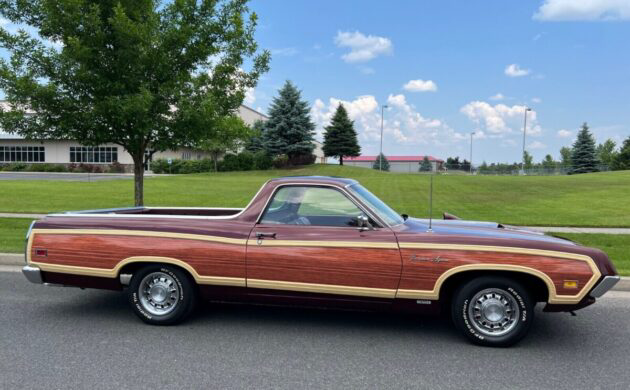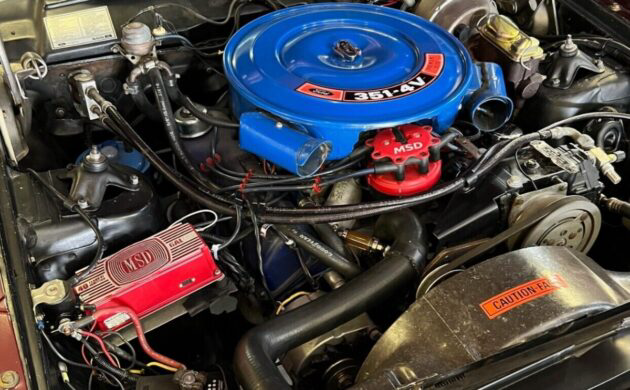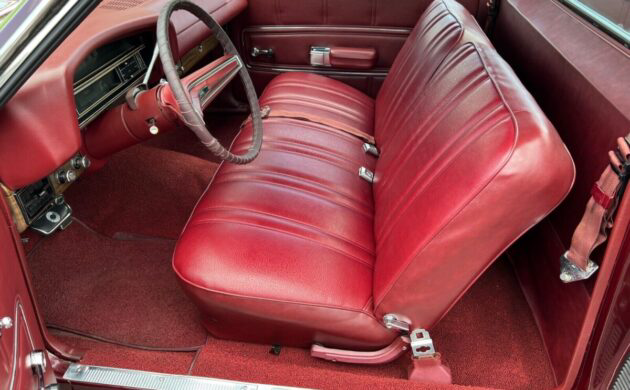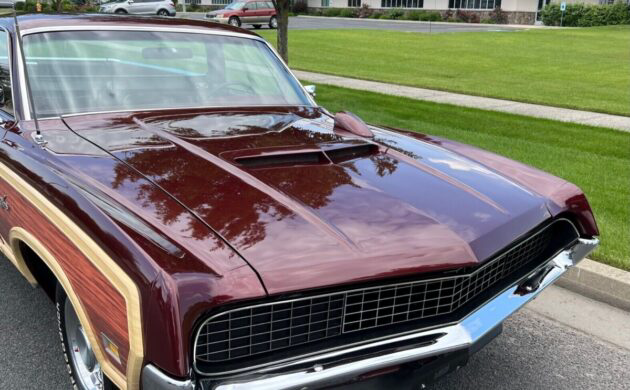The Ranchero, the El Camino, Dodge’s Rampage, Subaru’s Brat – these “coupes with truck beds” defy easy description. But the genesis of the genre lay in the recession of the late 1950s: buyers couldn’t afford two vehicles to haul people and stuff, so in 1957, Ford combined the functions into a single vehicle – the Ranchero. The El Camino followed in 1959. Called the “coupe utility” segment, the first vehicles started with station wagon bodies and replaced the rear section with a truck bed. Subaru joined the party in the late ’70s, and Chrysler’s Dodge division finally tagged along in the ’80s. Of course, as long ago as the 1920s, pickup beds were appended to passenger cars, but by the 1950s, we had marketing to tell us what we were looking at! And here on eBay is a striking example of a coupe ute, this 1970 Ford Ranchero Squire, bid to $20,300 in a no-reserve auction. That “49” in the first portion of the VIN (0A49H101918) confirms that this Ranchero left the factory as a Squire, and you know that any time you see that word associated with Ford, it means woodgrain trim – real in ’50-’51, “faux” after that. The “H” indicates the car left the factory with a 351 cu. in. V8 breathing through a two-barrel carburetor. This handsome brute has had a frame-on restoration, so you should be able to drive it home from Hayden, Idaho.
By 1970, the Ranchero had become a muscle car, departing from the original concept of economical utility. Buyers could still order it with a 250 cu. in. six-cylinder, but V8 options included the 302, 351, or 429. The venerable 351 Cleveland lies in this engine bay, complete with a four-barrel carburetor in place of the original two-barrel, and a C6 automatic transmission. Output should be around 300 hp for this combination. MSD ignition modernizes the start-up experience. While the first Rancheros utilized Ford’s full-size platform, the second gen’s sat on the compact Falcon platform. By 1970, we were back to full-sized – this time the base car was the new-ish Torino. In fact, the 1970 Ranchero was basically a Torino from the nose to the back of the cabin.
Buyers could choose from a variety of Torino options, but one new feature for 1970 was the badging. Rather than “Fairlane” or “Torino”, the interior badge finally read “Ranchero”. Other than modest wear, the cabin is completely serviceable – even impressive enough for Cars ‘N Coffee. This car has factory air in working condition. While it wasn’t an option I found in my research, the outside hood tach was a popular feature on muscle cars of the day. Personally, that tach is enough to make me want this Ranchero, even if it were in worse condition, but not everyone is in my camp.
The hide-away headlamps and Torino hood with big block scoop were also high-end options on the fifth-generation Ranchero. This combination of tough luxury is a siren song for collectors. Question marks include whether that 351 is original, the true mileage, and what documentation exists for the restoration. The current price is about right, making this Ranchero a potential bargain in the collector car landscape.







The woodgrain panels on ’52 & ’53 Country Squires were vinyl, but the trim surrounding it was genuine maple or birch. The real wood was replaced by fiberglass for ’54.
Better with Magnums?
The coolest 😎 hay-wagon 🐄 🐎
Are we sure this is a Cleveland? Both were available and both were H code. If they changed the C intake without changing the heads, they didn’t gain much.
The Cleveland has 8 valve cover bolts per head
Who can see the valve covers?
It’s a Cleveland.
I can see the valve covers well enough to tell it’s a Cleveland, totally different than a Windsor. No mention of a carb and manifold swap in the seller’s description, so I would guess it’s probably an original 4barrel Cleveland.
The coolant hose coming from the block , not the manifold is another Cleveland clue. The 2V heads with an aftermarket intake are a good option for the street. The old days swapping manifolds without the heads was a problem due to the major difference in port designs.
One of the nicest Rancheros I’ve seen in a long time. You definitely don’t see Squires everyday. Worth the crazy 2023 price.
Love this ride at my age I would use it for groceries, bank , n doctors appointments, would last me the rest of my life remember driving one back in the day loved it, and I drive like grandpa when I do drive, unfortunately fixed income makes this only a beautiful dream for me. Thank you for sharing it .
I usually am not real fond of Camino’s and Rancheros and such. But I like this.
The clevlands are pent roof rocker covers. The Windsor are not. Those are clevland rocker covers. The 2bbl heads will perform very well in traffic conditions with a 2bbl port configuration 4bbl manifold. It’s been done for decades. Not as high rpm as true 4bbl heads and intake but still very well.
Only the Ford 427 pent roof valve covers, Clevelands had the same valve covers as the 351M/400.
If you remember the story of the guy in PA who died with no heirs and his property ended up with the State He had a fetish for Black Fords in his garage they found a 69 Shelby GT500 428CJ with 7K original miles. One of his other gems he had a 71 Ranchero factory 351-4V Hurst 4 speed. This probably was a special order drivetrain I am sure it was not listed in the Ranchero Brochure but was available on a Torino GT and seeing how a Ranchero is just a Torino Pickup Ford agreed and did it. For the people who are not aware the difference between the 2V and 4V are more than just a carb there is at least a 50 HP gain due to bigger valves, higher compression, a different camshaft, Factory Dual Exhaust And now you had to buy Premium Gas. I think in 71 it was about $50 more for the 4V Motor over the 2V
We had one when I was really young. It was a tan or cream colored, black vinyl roof with a 429 in it. I Remember the fake wood. It did run really well.
Edelbrock made a 4v intake for 2v heads part number f 351 the 2 v heads performed better on the street than the 4v at liw to mid rpm super cool vehicle with ac to boot!
As someone else said, I’m not a fan of the Ranchero or the Camino … I do love the 70 Torino. And this Ranchero ticks enough Torino boxes that I say … yessir.
Hello fellas, I happened to google the vin number of my recent purchase and this site came up. I happen to be the owner of said ranchero squire. The motor is the original H-code 2 bbl motor with an Edelbrock “RPM” intake manifold and Holley 570 Street Avenger carburetor. The motor has been balanced and blueprinted with forged internals, and runs like it. Magnum wheels are a must.
I said “RPM” intake. It is the “Edelbrock Airgap” intake manifold and 570 Street Avenger carb.